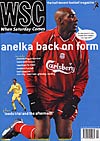 Roger Titford remembers Reading's 1994-95 season
Roger Titford remembers Reading's 1994-95 season
Reading have only spent 11 seasons out of the lower divisions since we joined the League in 1920. For ten of those 11 seasons our main preoccupation was to stop falling back into the lower divisions. For one season alone we walked with the giants and might have replaced someone like Aston Villa or Everton in the Premiership. It was 1994-95 and Reading went famously from “2-0 up and a penalty” to lose to Bolton in the play-off final.
It was a dreamlike season when the team and the club stepped completely out of character. Dreamlike in the sense that it was full of tribulations that appeared easily overcome as we seemed to drift inexorably to some preordained glory. All the small club stuff that was usually a problem somehow didn’t touch us. In October we were reduced to playing small boys in the forward line, on Boxing Day there wasn’t a fit centre-half in the club and by the start of 1995 we had four top players on long-term injuries. And no reserve team. Worst of all, Mark McGhee walked out halfway through the season to go to Filbert Street, taking the entire management team with him. He left behind a potential Lord of the Flies situation as the players sorted it out among themselves. Jimmy Quinn and Mick Gooding became the first (and so far only) joint-player-managers ever.
Season 1994-95 was the year whenUri Geller was around the club, trying to get over his “power of positive thinking”, getting us to channel our minds into the players’ heads: “Win Reading, win Reading, win Reading.” Tosh, of course, we all thought, but, as the season moved towards its climax, one small corner of my mind decided to ride with it, to accept our blissful fate, that this was, at last, our year. I had discovered optimism.
Ten games from the end we were still in with a shout. “It’d be a laugh to get in the play-offs,” we thought. (Laugh? We’ve never got over it.) Reading hit real form, almost for the first time and, to our amazement, we finished second. As they were reducing the number of teams in the Premiership that year, only one club went up automatically (Middlesbrough), so we were in the play-offs. The first leg was away at Tranmere and, before the game, mournful Tranmere fans who had tasted the ashes of play-off defeat for two years running already thought too we would be the men on the day.
We sat high in that big stand behind the goal, two or three thousand of us, in excellent voice. This was all bunce, all bonus to us. We were fresh out of the Second Division and not expecting much from the season. Now we were here to enjoy ourselves and Rovers were shaking like jelly. Big blue sky, Tranmere in white, Reading in bright blood red and off we went with a carefree zest. It was easy. Our best big match performance away in years. Lee Nogan slalomed his way through the Rovers defence for the decisive second in front of the jubilant Reading fans, and we were pretty much through to the play-off final with a 3-1 lead and the home leg to come. And in the first half of the final we played just as well, turning round 2-0 up and talking about season ticket arrangements for next season throughout half-time. Be positive, man; it’s going to be our year. Stop worrying about that missed penalty!
Reading had crept up on the top division like an ambush. Nobody thought we’d last, the national press didn’t even get round to patronising us and TV covered us once all season. Most of our team was either too old to interest other clubs, injured, unknown or lower division men playing beyond themselves, and we didn’t have a “real” manager. Now all we had to do was defend a 2-0 lead for half an hour for the amazing journey to be complete. And, like all the best dreams, the alarm clock went off at just the wrong time.
From WSC 180 February 2002. What was happening this month